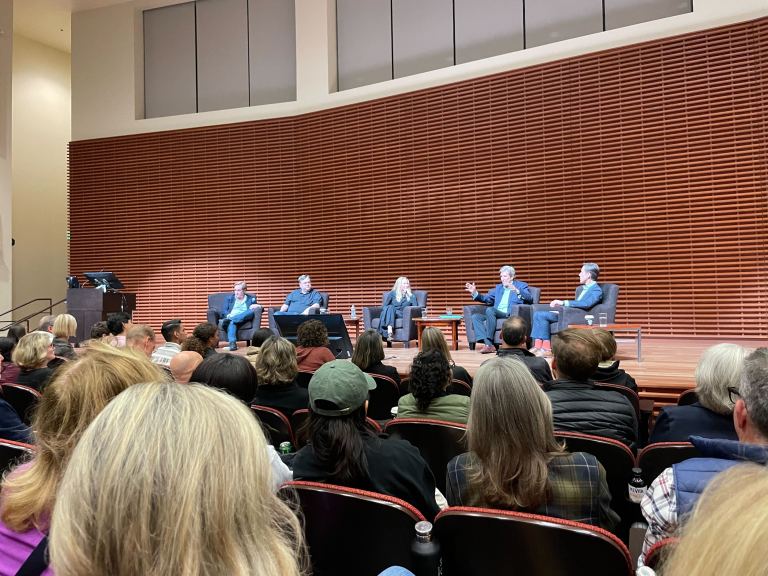U.S. Special Envoy for Climate and former Secretary of State John Kerry surprised the audience of SOC 64: “Shaping America’s Future: Exploring the Key Issues on Our Path to the 2024 Elections” during a panel of leaders in technology and politics speaking on climate change, the future of technology and American democracy.
The Nov. 13 panel, part of the one-unit speaker series, featured LinkedIn co-founder and early OpenAI investor Reid Hoffman, Emerson Collective founder and president Laurene Powell Jobs and former Obama White House Director of Political Affairs David Simas. Kerry was a surprise guest, joining while in the Bay Area for the Asia Pacific Economic Cooperation conference in his capacity as Special Envoy for Climate.
The planned discussion was around technology, but the focus quickly turned to more general challenges facing American democracy.
“The biggest challenge the U.S. faces in the world today is not external; it’s internal,” Kerry said, citing a fractured media landscape in America as a key factor in its current polarized political climate.
According to Kerry, the lack of key moderators and arbitrators in the media landscape prevents Americans agreeing on a broad base of truth, upon which they can debate about policies and plans. He said in the past, these moderators took the form of trusted newspapers and television reporters such as Walter Cronkite.
“If I’ve lost Cronkite, I’ve lost [middle] America,” Kerry said, paraphrasing a famous quote from President Lyndon B. Johnson regarding public sentiment about the Vietnam War.
Jobs pushed back on the narrative that the centralization of the media was entirely positive.
“It’s not the worst thing to have a diversity of news and information sources. It may not be the best thing that Walter Cronkite held center stage,” Jobs said, going on to say that Cronkite and his views did not represent many Americans.
Jobs added to Kerry’s broader point about the lack of a commonly accepted public truth, emphasizing the importance and failures of the educational system.
“In order for democracy to work, we need an educated, informed citizenry. And if you look at any measure for public education in the United States, it’s separate, unequal and underperforming, and has been for decades,” Jobs said.
Hoffman said there is great potential to improve education through technology, with AI smartphone tutors customizing education to particular age groups and reducing time wasted by teachers on grading.
Regarding the media, Hoffman pointed to the rise of cable news as an origin point for narrative fracturing, and pointed to X’s (formerly Twitter’s) misinformation correction boxes as a way that “technology can very much be part of the solution.”
The panelists agreed that, good or bad, technology today has a major influence on how people get news.
According to Simas, 75% of adults aged 18 to 22 use TikTok — a platform not limited to three news channels like the early days of television — as their primary source of news information.
As a caveat, he observes that average people are taking more and more active roles in society.
“What we’ve seen … is a new spirit of citizenship that is active and not consumptive,” Simas said.
Kerry also expressed optimism about American democracy.
“We have the ability to avoid autocracy by making democracy work around a set of ideas that are tangible, real,” Kerry said.
The conversation later turned to climate change, with Kerry expressing hope that climate denialism and pessimism can be overcome with a positive vision of economic opportunity.
“The demand for workers — for pipe fitters, for plumbers, electricians and heavy equipment operators and people who put steel cables together … all of this work is waiting to be done,” Kerry said. “You talk about economic opportunity? This is the greatest opportunity we’ve had since the industrial revolution.”
That vision could become reality, according to Jobs.
“I believe that the future that he just outlined is absolutely within our reach,” Jobs said. “What we’re transitioning to is cleaner, greener, healthier, safer, more abundant, more beautiful, more flourishing. It’s not that we’re transitioning into something negative. We’re actually transitioning into a clean economy.”
Hoffman was optimistic about the possibilities, but emphasized the need for political will. He said that the average person has to feel results in the short term, and must be sold on the green transition benefiting them before they will lend their support to it.
To conclude, Steyer brought the class’s teaching assistants to the stage, asking the panelists, as representatives of Stanford students, to give one piece of advice.
“Graduate,” Kerry said, prompting laughs.
“Believe in a basic set of values and be willing to put yourself at risk to fight for them and don’t let anybody tell you you’re too young or not experienced enough. Young people have defined every major movement in this country,” he said. “You are the leaders and don’t forget that. And hold everybody else accountable.”
A previous version of this article misstated Laurene Powell Jobs’s prior work and role. The Daily regrets this error.
